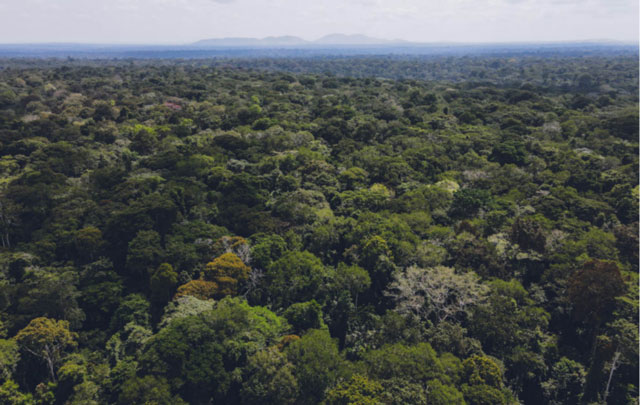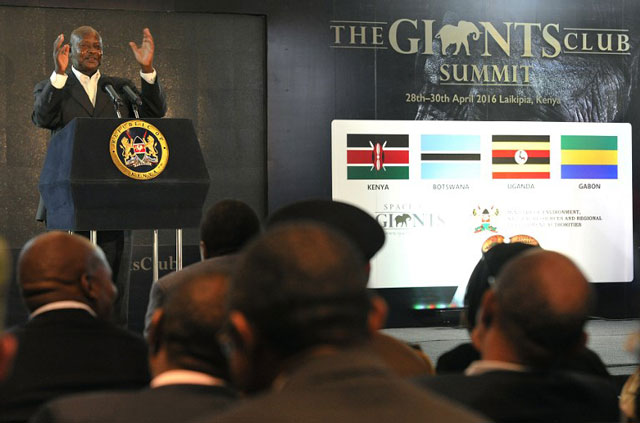
African Leaders demand compensation for protecting the world’s carbon sinks
ANALYSIS | RONALD MUSOKE | African leaders, business executives, and climate change activists have stressed the need for financial resources to be mobilized to ensure that the African continent restores and protects its critical ecosystems which are critical in sucking in and storing carbon. These include; Africa’s savannahs, mangroves and swamps, coral reefs and marine reserves.
The sentiments came out on Nov.03 during a high level event on the sidelines of the ongoing global climate conference in Glasgow, Scotland. This was two days after leaders from over 100 countries pledged “to end deforestation by 2030.”
The side event was organised by the Giants Club, an initiative of the international conservation organisation, Space for Giants, which operates in 10 African countries including; Botswana, Gabon, Kenya, Rwanda and Uganda and is dedicated to ensuring a healthy planet on which both large wild animals like elephants and people exist.
President Uhuru Kenyatta of Kenya headlined the event alongside Max Graham, the founder and CEO of Space for Giants who chaired and moderated the event, Lord Evgeny Lebedev, who co-hosted the event with President Kenyatta, Peter Bacchus, a veteran investment banker who is the chairman of Bacchus Capital, and Akinwumi Adesina, the president of the African Development Bank.
Max Graham compared the US$100 billion that rich countries have promised to developing countries to help tackle the climate crisis to the hundreds of billions of dollars consumers in the western world spend on indulgences like pets, ice cream, beer, and coffee.
“Is US$100 billion really a lot of money?” The world spends US$ 623bn on beer. The Americans alone spend US$53 billion on pet food. The world spends about US$ 90 billion on hair shampoo and US$57 billion on ice cream and US$100 billion on coffee.”
“Despite the devastation caused by the pandemic on the global economy last year; we spent US$ 2 trillion on military (hardware) which was 2% more than the amount spent a year earlier. We are also spending US$ 5.9 trillion on fossil fuel subsidies.”
“If we collectively spend hundreds of billions of dollars on items that are not essential for our survival, it seems completely inexplicable that we are not paying for the price of something we need for our children’s future,” he said.
Graham said carbon offsets presented the opportunity to rewire “this madness.”
“We can rewire the economies that have paid the cost of goods that we actually need, specifically, in today’s case, the restoration and protection of Africa’s carbon sinks,” he said.

The event was attended by representatives of the presidents of Gabon, Uganda, and Rwanda, as well as specialist investors and philanthropists.
President Museveni who did not travel to Glasgow but was represented by Beatrice Anywar Atim, Uganda’s state minister for environment said in his speech that Uganda and Africa need resources to be mobilized to ensure that there is “a soft landing for environmental transgressors.”
“With enough resources, and that is the money we are here to demand for, this is doable,” Museveni said, adding that the world should forget about conserving the environment if the continent continues to conserve underdevelopment.
“Environmental damage is caused by irresponsible, greedy, ignorant and rebellious human beings who don’t respect God’s commands and nature’s tested arrangements,” he said. It is these people who are destroying forests, wetlands and other strategic ecosystems.
Museveni said the climate crisis on the continent can only be averted if African economies get transformed by first ensuring that the young people get an education coupled with rapid industrialisation and electrification. The latter development, Museveni said, would ensure that the continent does away with biomass (firewood) which a great percentage of Africans still depends on for energy.
President Kenyatta noted that despite Africa accounting for 18% of the world’s population, it accounts for less than 4% of global greenhouse gas emissions.
“Our savannahs, mangroves and swamps, our coral reefs and our marine reserves, are the carbon sinks of the world. They are the basis of the very oxygen that we breathe every day,” Kenyatta said.
“Yet that great public benefit that the African ecosystem provides to the world has not yet been fully acknowledged. And it is neither sufficiently protected and we have certainly not been compensated for it. It is for this reason that many of these natural ecosystems have been degraded often by our own local communities, who have few economic alternatives.”
Environmental conscious consumers
Kenyatta said the world has an opportunity to marshal financial resources for conservation considering that investors, consumers, and shareholders are beginning to demand their companies start a process of decarbonizing their activities, and moving towards a much more carbon-neutral world.
“If these companies and countries were to move towards becoming carbon neutral, they need viable, high quality carbon credits to offset their residual emissions. We must together create an enabling environment to enable the conscientious investments needed in restoring and protecting the great natural carbon capture machines that were gifted to us by God and nature.
“Restoring and protecting these carbon sinks can help create hundreds of thousands of critical green jobs, drive enterprise away from destructive forms of land use, help us tackle poverty, combat illegal wild wildlife trade, and also prevent future pandemics, and ensure that the diversity of life on which we all depend continues to endure.”
“This I believe will provide a clear pathway for private sector investors to invest in the restoration and protection of our carbon sinks, ensure that investments are made in a way that generates the highest possible return to communities who live in and around carbon sinks, and generate royalties for our treasuries,” he said.
Lord Evgeny Lebedev said Africa’s carbon sinks were not yet being fast degraded or lost, as was the case in other key landscapes across the planet.
“We must not repeat the Amazon’s deforestation catastrophe,” Lord Lebedev said. “We must preserve iconic landscapes helping to sequester vast stores of carbon.”
Lee White, Gabon’s Minister for Forests, Oceans, Environment, and Climate Change, highlighted the importance of Africa’s carbon sinks, and the risk to the entire planet of failing to protect them.
“There’s no 1.5 degree world without an intact Congo Basin,” he said. “There are six years of global emissions locked up in the trees and the soils of the Congo Basin. The IPCC tells us we only have eight years to deal with this problem. So if we lose the Congo Basin we lose 1.5 degrees, we lose 2 degrees, we lose 3 degrees, we’re heading to a fourth degree as well.”
He added: “So the question is, how do we make these forests valuable enough to people? If the forests are not valuable, the forests will not survive.”
For Beatrice Anywar Atim, Uganda’s state minister for environment, redressing the imbalance between those responsible for causing the climate crisis and those who will bear its greatest consequences is vital for COP-26’s goals to be realised equitably.
“Let us put the resources collectively where it matters, and it matters in Africa,” she said. “It is Africa that can save the world from the effects of climate change.”
Peter Bacchus, a veteran investment banker who is the chairman of Bacchus Capital and a member of the Giants Club said the opportunity to price carbon through offsets could be “transformational for conservation.”
“It starts the journey of beginning to recognise heritage landscapes more specifically for the benefits they provide both to the environment but also for the economic activity that they support through sequestration, which is essentially the sea change that we’re seeing through the development of carbon markets,” he said.
Meanwhile, Akinwumi Adesina, the president of the African Development Bank, which provided the venue for the event at the Africa Pavilion at COP-26, warned that frameworks Africa develops to manage offset policies must be watertight, to ensure sustained benefit.
“Critically important is the issue of accounting and transparent reporting of Africa’s homegrown carbon offset systems,” he said. “I cannot emphasize enough the importance of analytical and policy work to help determine the appropriate pricing of carbon.”
Wanjira Mathai, vice president and regional director for Africa at the World Resources Institute, stressed the need for new finance to be available at different scales. “If the narrative for transformation of people is about prosperity, which really does have a unique opportunity to transform lives, then we have to figure out the financing in smaller envelopes,” she said.
“It’s the communities that are there doing the restoration (of nature) every single day. How do you have these intermediaries deliver finance to community groups in effective ways, and really get the resources to them?”
 The Independent Uganda: You get the Truth we Pay the Price
The Independent Uganda: You get the Truth we Pay the Price


